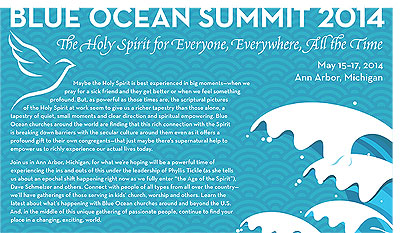By Debbie Eisenbise and Tim McNinch

What does the Emergent Church movement have to say to us Brethren? The Vineyard Church of Ann Arbor and St. Clare’s Episcopal Church (two very different congregations in Ann Arbor, Mich.) co-sponsored the Blue Ocean Summit, an ecumenical conference, May 15-17. Blue Ocean Faith is an informal network of churches, leaders, and laity who aim to live out vibrant Christian faith in predominantly secular settings, among and with secular-leaning folk.
The case was made that more and more people in the United States consider themselves to be unaffiliated with any faith. Charles Park, pastor of the River Church in Manhattan, N.Y., quoted a survey that asked people to give the first word that came to mind when they heard “Christian.” More than 85 percent reported: “judgmental.” This was not a surprise to most of the 250 in attendance, but a point of confession and motivation. How can we reach those who are skeptical but curious about faith, in a way that fully conveys the love of Christ? How can we welcome people into worship, engage them in service, pray for and with them, just as they are?
The challenge of the conference was articulated in its theme: “The Holy Spirit: For Everyone, Everywhere, All the Time.” The underlying assumption: that the Holy Spirit is relevant not just to Christians, but (as Dave Schmelzer, Blue Ocean Faith’s national director, put it) “to that category of people called ‘people.’” The Spirit of God goes before us even in this secular culture, and conversation and community can provide understandings and experiences that cultivate faith.
Keynote speaker Phyllis Tickle, author of the seminal book, “The Great Emergence: How Christianity is Changing and Why” (Baker Books, 2012), suggested that a new theological and liturgical emphasis on the Holy Spirit is emerging in this time of cultural transition. She contended that historical shifts come down to crises of authority, and that the church in the West is now moving from Luther’s emphasis upon the scripture alone to a Spirit-centered faith. This speaks to our Brethren roots in Spirit-led worship and in Alexander Mack’s counsel* that only through the inspiration of the Holy Spirit is one “impelled through inner hearing, to true obedience.”
When asked about the Church of the Brethren and the Emergent Church, Tickle commented: “The Church of the Brethren is new enough, young enough, and nimble enough to embrace the Emergent Church movement and help it along, give it some rootedness. The Brethren peace position is where the church is going, yet, ironically, the Brethren are not wholly engaged in the Emergent movement.”
A recurring theme at the Blue Ocean Summit was the sociological description of Christian community as a “centered set” with participation contingent not on maintenance of in-or-out boundaries, but movement toward a central focus (Jesus). This emphasizes lived values rather than dogma; which again echoes our own theology.
Conversations and discussions at the conference lifted up the multiplicity of ways by which one may grow in faith, from praying the hours, to speaking in tongues, to living in community, to establishing coffee houses rather than churches, and hosting discussions on topics of spiritual depth online, in living rooms and in public settings.
A challenge to our denomination is to consider how we might better engage the world around us while expressing our faith. The first Brethren held open-air baptisms. They took their faith public. How could we do that today? And what do we have to share with those in the Emergent Church movement?
* Alexander Mack wrote: “A man can…read the Scriptures outwardly and talk and write about them, but, if the spirit of faith is not in him, he will not be concerned with the commandments therein, nor be frightened very much by the threats which they contain. This is because the inner ears are not yet opened…. When a believing person whose inner ears are opened reads the Holy Scriptures outwardly, he will hear as the Lord Jesus intends…. He will also be impelled through his inner hearing, to true obedience…[which] gives him strength and power to follow Jesus” (“The Complete Writings of Alexander Mack,” p. 84).
— Debbie Eisenbise and Tim McNinch co-wrote this piece for Newsline. Eisenbise is an ordained minister in the Church of the Brethren, living in Kalamazoo, Mich. McNinch attends Skyridge Church of the Brethren in Kalamazoo. They report that the “Anabaptist contingent” at the Blue Ocean Summit also included Paul Versluis, pastor of Ann Arbor (Mich.) Church of the Brethren/Mennonite Church, and his wife, Elisabeth, and a pastor from Reba Place, a Mennonite community in the Chicago area.